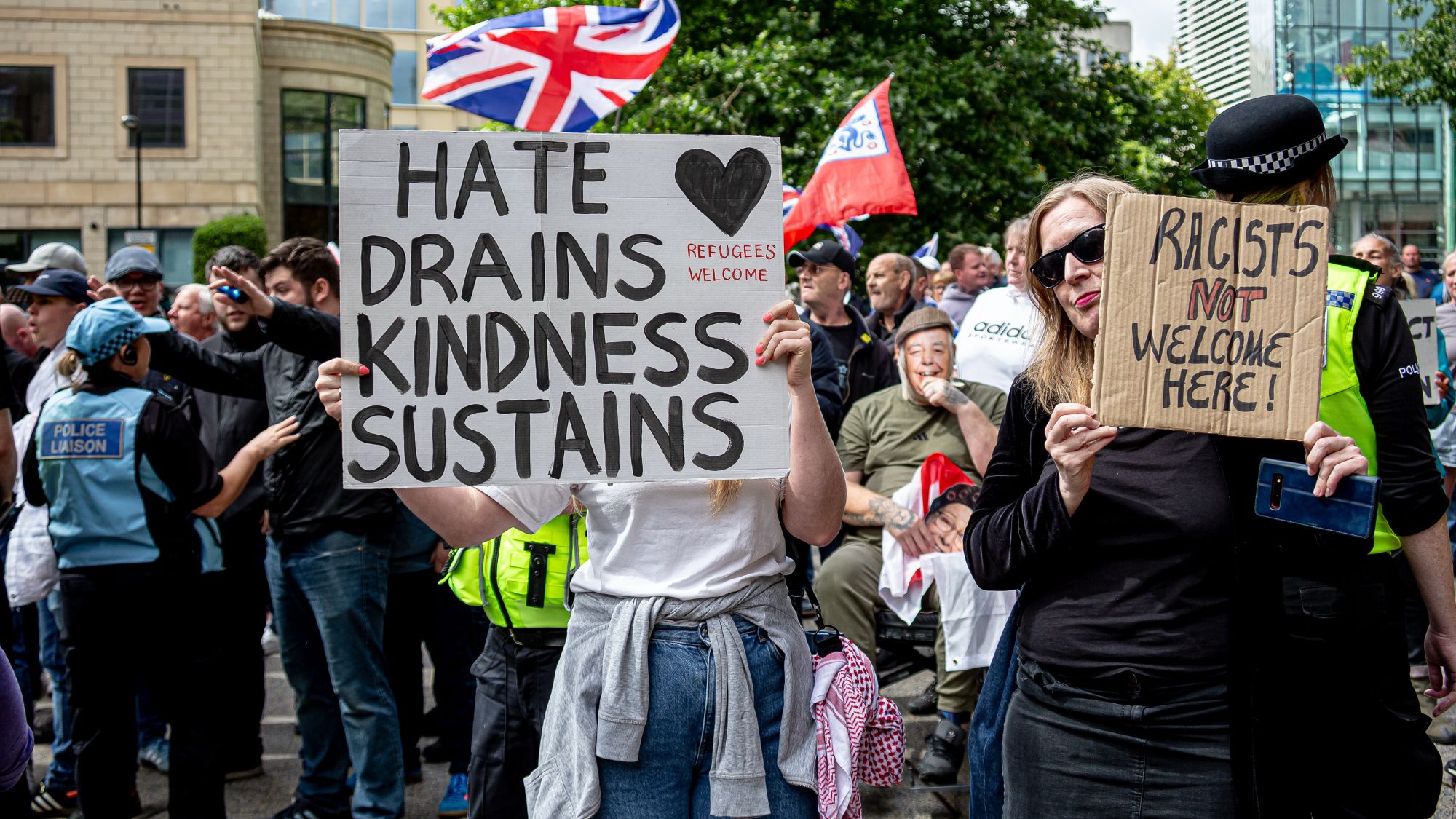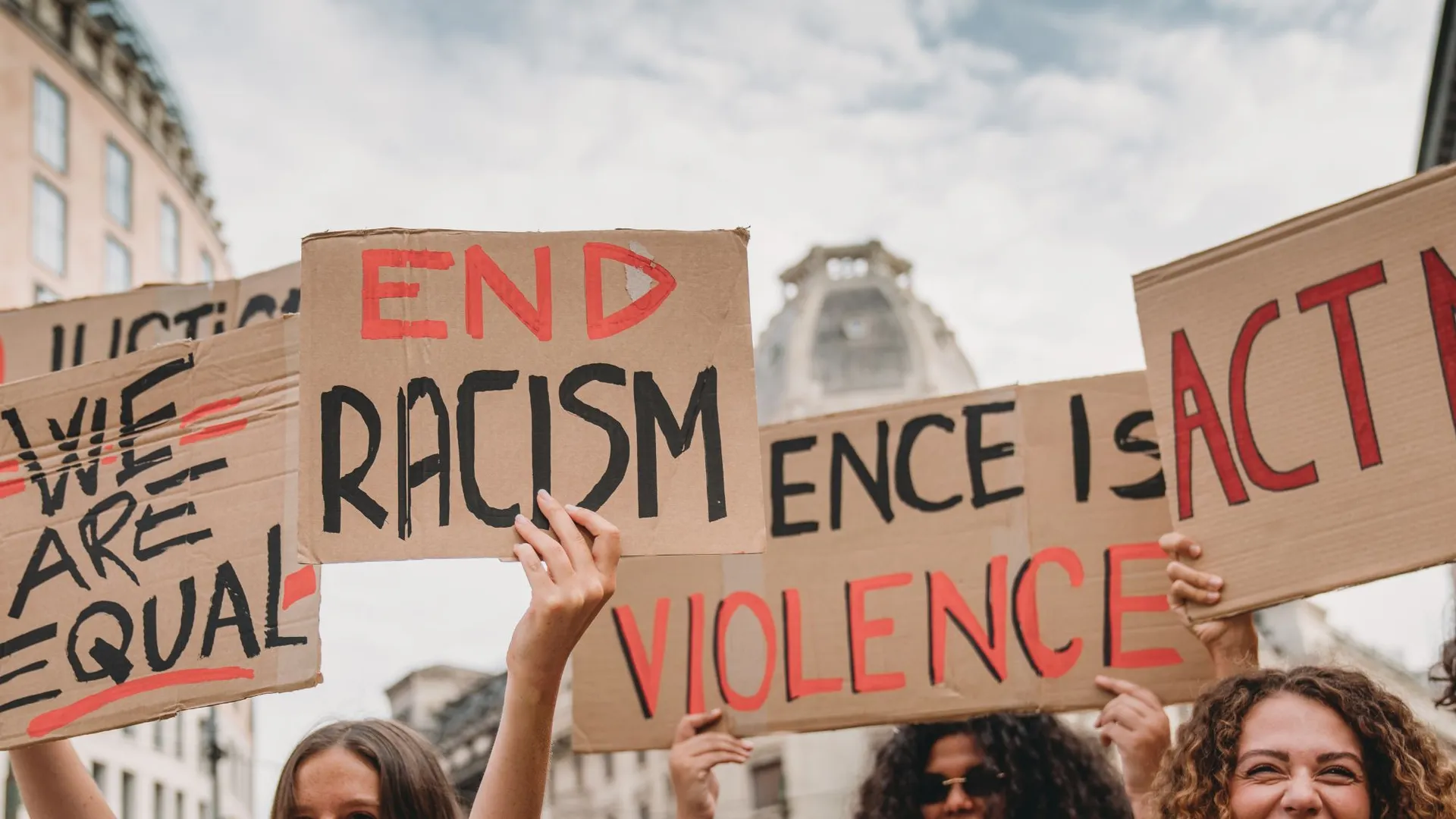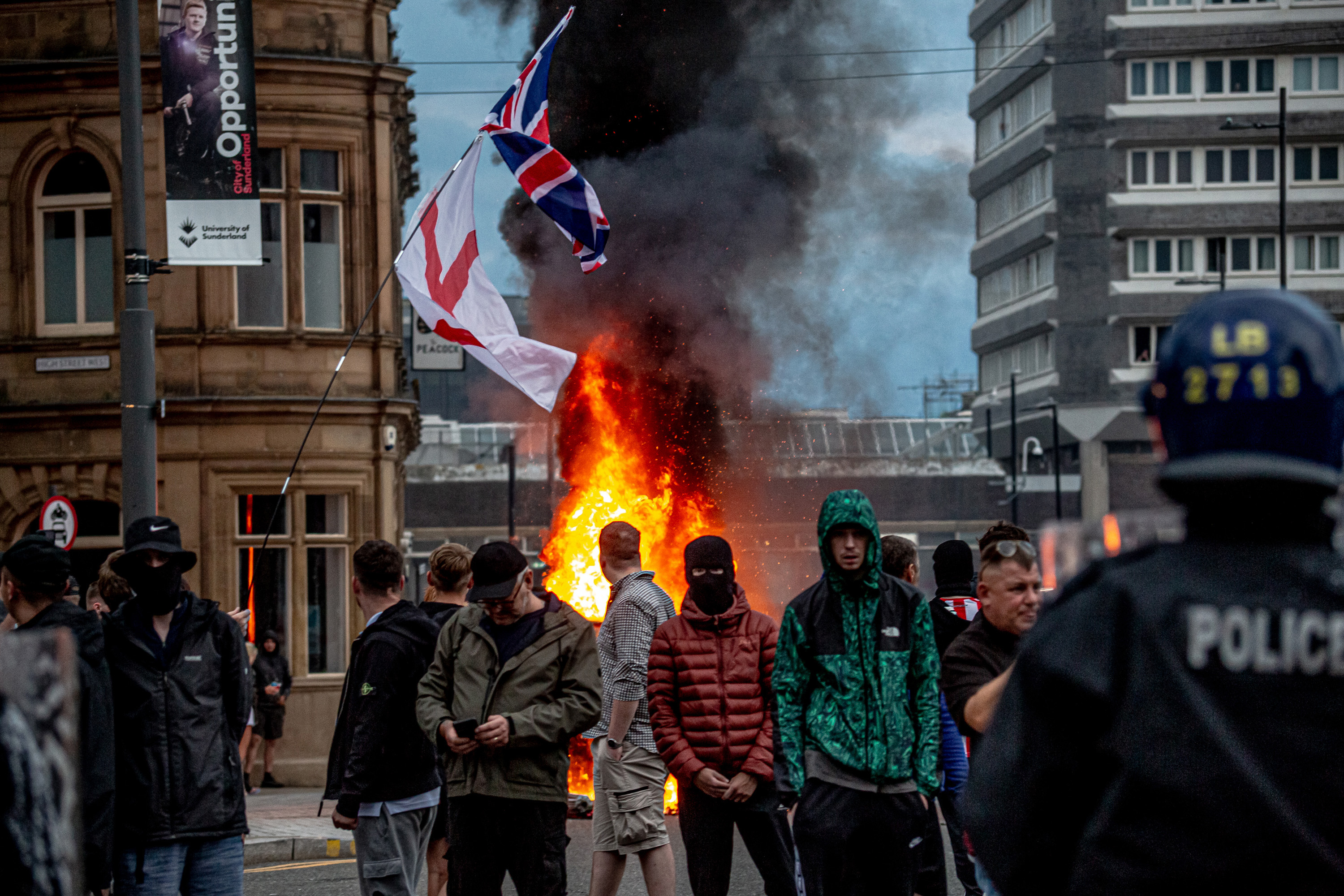How Women’s Safety is Being Hijacked by Far-Right Vigilantism
Political figures and far-right extremists are exploiting women's safety concerns to fuel dangerous agendas


Celebrity news, beauty, fashion advice, and fascinating features, delivered straight to your inbox!
You are now subscribed
Your newsletter sign-up was successful
“I don’t know one woman who would tell you that having random groups of men who are private citizens aggressively patrolling the streets would make them feel safer,” says women’s rights campaigner Jess Davies. She’s referring to Reform MP Richard Tice’s chilling call to action, suggesting that groups of men should patrol the streets in the name of women’s safety.
Of course, Tice framed his suggestion as a response to very real fears over women’s safety, which was declared a “national emergency” last year, but the underlying message is far more troubling. It normalises the idea of taking the law into your own hands. He is far from the only public figure tapping into societal fears to promote the idea of self-appointed “protectors,” and it dangerously blurs the lines between justice and vigilantism.
Tice’s comments that “It’s actually part of our neighbourly duty to protect our own” come at a time of heightened political polarisation, where anti-immigration rhetoric is being weaponised to amplify public discontent.
Tice’s idea of vigilante patrols plays into a larger narrative that paints communities as under threat, often blaming immigrants and refugees. It’s the kind of rhetoric that plays into the hands of far-right extremists, like Tommy Robinson, who profit from spreading anti-immigration sentiment.

This week, news broke that Robinson—the co-founder of the English Defence League (EDL)—has begun charging far-right extremists £28 per minute for so-called “expert advice” on pursuing “anti-Islam activism,” according to an investigation by The Times. The report reveals that via Minnect, an app owned by conservative US commentator Patrick Bet-David, Robinson has sold over 300 sessions in just two months.
One recent exchange highlighted on his profile saw a customer calling for a “military-style” response to what they described as an “invasion.” Robinson ominously responded, warning of “the danger of Islam” and claiming that Britain was in a “race against time.” This is hardly new ground for Robinson, who has long fuelled the narrative that immigrants, particularly Muslims, are existential threats to British society. On social media platforms, he routinely spouts the idea that violence or vigilantism is justified to ‘protect’ the nation.
Just today, Black Lives Matter UK shared the harrowing story of Olajuwon Ayeni, who was racially abused and falsely branded a paedophile after Robinson pulled a video of Ayeni playing with his step-grandchildren in the park from Ayeni’s wife’s TikTok account. The video, shared with Robinson's 1.4 million followers on X, was captioned “Wtf is even going on here? Where are the parents?!” The vitriol was swift, and the couple tell The Guardian they’ve been living in fear ever since.
Celebrity news, beauty, fashion advice, and fascinating features, delivered straight to your inbox!
A post shared by BLMUK (@blmuk)
A photo posted by on
This strand of so-called vigilantism has devastating and far-reaching consequences. Yesterday, Anna Turley, MP for Redcar, where Ayeni and his wife Natalie live, had to write a reference of good character for Ayeni after he was suspended by his management due to the misinformation. Ayeni has also been subjected to abuse and violent threats.
This is just the latest example of the growing commercialisation of hate. Robinson is tapping into a global audience of extremists, using platforms like X and Minnect to push his dangerous narrative of fear and division.

On the 28th June 2025, football fans marched to Downing Street in a demonstration titled "Football Lads Against Grooming." The protest, aimed at addressing concerns over Islamic grooming gangs allegedly targeting British girls, followed the Prime Minister's announcement of a national inquiry into the issue.
Nazek Ramadan, Director of Migrant Voice, sees the rise in vigilantism as a direct result of political and far-right figures exploiting public fears about migration. “There are genuine issues facing the UK—people are struggling to afford to pay bills, buy food, access medical treatment, and rent or own properties,” she explains. “Sadly, some have chosen to weaponise these issues to drive anti-immigration sentiments.”
The danger isn’t just in the words themselves, but in how they mobilise people with dangerous ideologies who feel compelled to take matters into their own hands. Tice’s call for “groups of men” to take to the streets ties directly into this heated environment, where a sense of lawlessness is not only encouraged but cultivated. This aggressive agenda, alongside the profit-driven motives of people like Robinson, is building an atmosphere where self-appointed vigilantes feel emboldened to act out of fear and hatred in the name of protecting women and children.

Protestors at an 'Enough is Enough' demonstration on August 02, 2024 in Sunderland, England.
While extremists paint migrants as threats to community safety, experts such as Imran Hussain, Director of External Affairs at the Refugee Council, are quick to counter these stereotypes. “What often fuels hostility is misinformation and negative headlines,” Hussain points out. The truth, however, is starkly different. Hussain explains that refugees, often fleeing war and persecution, are seeking refuge and opportunities to rebuild their lives. “When refugees are welcomed, everyone benefits: local economies get a boost, skills gaps are filled, and communities gain people who want to work hard and give back.”
The UK's current political climate, where social anxiety can be exploited for personal and political gain, is part of a dangerous cycle that feeds further division. Lucy Mort, principal research fellow at the Institute for Public Policy Research, warns that anti-immigration rhetoric is not only fuelling fear but normalising protests and, alarmingly, vigilantism. “Anti-immigration rhetoric is clearly fuelling fear and division,” she says, adding that it preys on people’s real struggles, such as economic hardship and job insecurity. “It gives oxygen to the far-right and normalises protests and even vigilantism—often rooted in harmful racial stereotyping.”
This growing atmosphere of fear creates a dangerous feedback loop, where groups, inspired by this rhetoric, take matters into their own hands. The recent protests targeting hotels housing asylum seekers is a prime example of this. Hussain adds, “We’ve seen how protests outside asylum hotels can terrify people who’ve already fled war... These incidents don’t reflect most communities.”

Protesters gathered near the Bell Hotel in Epping, England, on July 27, 2025, to protest the hotel's use as migrant accommodation. Both anti-migrant and counter-protesters rallied in the area. Far-right activist Tommy Robinson had announced plans to attend but ultimately did not. The protests were sparked by the recent arrest of an asylum seeker on suspicion of sexual assault in the town.
As calls for vigilantism grow, so does the need for sensible, compassionate policy reform that addresses the root causes of these fears. Mort advocates for a shift towards community-based solutions: “We need community-based solutions, with local authorities supported to expand temporary housing options and deliver more sustainable, humane solutions that work for everyone.”
Hussain also offers a more optimistic view of what the UK could look like if it embraced better asylum processes: “If the system made quicker, fairer decisions, people could move into proper housing, start work or training, and contribute to the local economy.” These reforms would not only alleviate pressure on public services but would help integrate refugees, allowing them to rebuild their lives with dignity and contribute positively to their communities.
For Nazek Ramadan, the shift must come from both the political class and the public. “When people realise what those positives are, and the way in which migrants are treated in the UK, they have more positive attitudes towards migration on the whole,” she says. This begins with a commitment to truth and transparency, challenging misinformation head-on and emphasising the many ways in which migrants and refugees contribute to the UK's social and economic fabric.
The rise of vigilante rhetoric—whether it’s calling for street patrols or exploiting hate for profit—must be met with a unified response that rejects division and embraces empathy.

Mischa Anouk Smith is the News and Features Editor of Marie Claire UK, commissioning and writing in-depth features on culture, politics, and issues that shape women’s lives. Her work blends sharp cultural insight with rigorous reporting, from pop culture and technology to fertility, work, and relationships. Mischa’s investigations have earned awards and led to appearances on BBC Politics Live and Woman’s Hour. For her investigation into rape culture in primary schools, she was shortlisted for an End Violence Against Women award. She previously wrote for Refinery29, Stylist, Dazed, and Far Out.